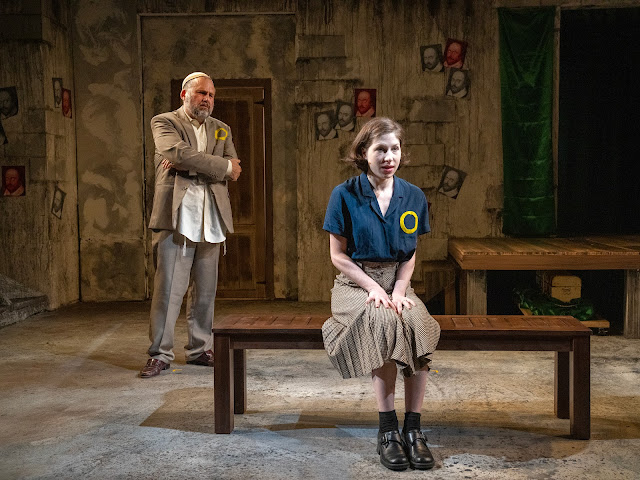The Shylock and the Shakespeareans
Written and directed by Edward Einhorn
154 Christopher St., Manhattan, NYC (also available on demand)
June 1-17, 2023
 |
| Jeremy Kareken and Yael Haskal. Photo by Richard Termine |
With the storied New Ohio Theatre slated for an August close, this summer, Untitled Theatre Company No. 61 (UTC61) takes to its stage to provide us with a pointed and timely look at the influence of theatre and the tropes therein on our own current cultural moment.
The Shylock and the Shakespeareans is something like a retelling or reimagining of the Bard’s universally regarded and deeply problematic
The Merchant of Venice. Writer and director Edward Einhorn updates the setting, while still keeping us deeply rooted in Shakespeare’s familiar climes. The action of the play undulates familiarly back and forth between the cosmopolitan world of Venice and gentile Belmont. Costumes blend the old and the new: smart contemporary looks and contemporary military fatigues paired with Elizabethan ruffs; guns in place of swords. Instead of Shylock, we get a deeply sympathetic Jacob (Jeremy Kareken), a jeweler – labeled a “shylock” by the antisemitic mobs of the play – and self-identifying “Shakespeareans,” disguised in masks bearing the Bard’s (in)famous visage, led by Gobbo (Craig Anderson), a former servant of Jacob’s and the most dangerous sort of small mind. Kareken’s Jacob is wise, an empathetic reading of the character masterfully played, and Anderson excels as the foil, a compelling performance that pulls from the darkest, laziest, and most destructive form of bigotry, be it from the epochs imagined by Shakespeare and Einhorn or our very own.
 |
| Janine Hegarty, Chase Lee, Yael Haskal, and Ethan Fox. Photo by Richard Termine |
At the core of the play is the particular brand of antisemitism that Gobbo and his lot embody, and its place in Shakespeare’s oeuvre. The audience is asked to confront the legacy of Shakespeare, our own relationship to his texts, their artistic merits, and the resonant anti-Jewish sentiment therein. We are asked how we might address the cognitive dissonance resultant from
The Merchant of Venice. As an audience member, ostensibly a disciple of a sort of Shakespeare’s work, what are we to make of the virtues of the text alongside the undeniable antisemitic hate? What of the impact of these names – shylock – and blood-libelous images on the contemporary imagination, be it in the theatre or in the streets? Gobbo is also funny – malapropisms of the best kind abound, as do typological errors in the hateful graffiti which marks the set (“The Jews will not replase us”). Einhorn asks us to laugh at the utter stupidity of these sorts of antisemites and their brand of antisemitism, but simultaneously admonishes us, here in the 21st century, in Manhattan, to remember that hate, in all of its guises and all of its proponents, is nevertheless deadly.
 |
| Janine Hegarty, Stephanie Litchfield, and Nina Mann. Photo by Richard Termine |
But it is Jessica (Yael Haskal) who stands out as the undeniable star both of the narrative and of the production. She is reimagined such that her isolation – the liminal space that she occupies as neither Jew nor Christian – is centered. Haskal’s performance is devastating. She handles the matter (changes in narrative tone, costume, etc.) such that the viewer cannot help but focalize through this textured character who is effectively unmoored. Nina Mann brings an equally compelling performance as Portia – her commanding poise and composure anchor her presence as gentile privilege personified and shine another source of light on the horrible realities that Haskal’s Jessica is doomed to live.
 |
| Eric Oleson and Craig Anderson. Photo by Richard Termine |
Einhorn’s self-described “farce gone terribly wrong” lives up to this description throughout the show’s second act and the crescendo of chaos leading up to the play’s final dramatic moments. A flurry of action – gunshots, strobe lights, rended garments, and two domineering solo performances by both Haskal and Eric Olseon as Shakespeare himself – brings the nonsensical absurdity of the forces of hate to bear on the viewer, simultaneously confronted with the absurdity of the dramatic situation and the ironic and deft delivery of Shylock’s “Hath not a Jew eyes?” monologue. The drama of the farce is further highlighted by the dynamic and surprising stage production: before and after key moments, the actors enter and exit the New Ohio’s low stage at stage left, just feet away from audience members, further extending the show’s capacity to leave no quarter for those who may wish to avoid the discomfort of facing the devastation – past and present – of the core subject matter. In this way – and many others –
The Shylock and the Shakespeareans demands that its audience look in all directions: inward to examine our own biases and outward to consider the impact of the ivory tower on the living texts and bodies of the 21st century.
-Noah Simon Jampol







Comments
Post a Comment